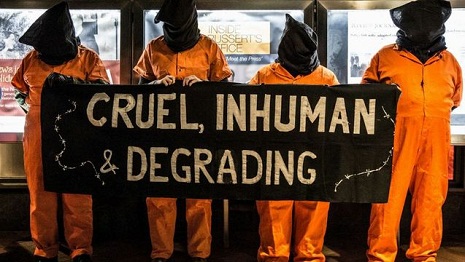The report contains the findings of an investigation led by a former federal prosecutor and appears to represent the most detailed examination to date of the complicity of psychologists in interrogation programs that at times relied on torture.
The probe concluded that the association’s ethics director and others had “colluded with important [Department of Defense] officials to have APA issue loose, high-level ethical guidelines that did not constrain” the Pentagon in its interrogation of terrorism suspects at Guantanamo Bay, Cuba. The association’s “principal motive in doing so was to align APA and curry favor with DOD.”
The investigation also found that “current and former APA officials had very substantial interactions with the CIA in the 2001 to 2004 time period” when the agency was using waterboarding and other brutal measures to extract information from detainees.
In particular, a CIA contract psychologist with close ties to the association played a key role in “clearing the way” for a colleague, Jim Mitchell — widely considered one of the architects of the controversial interrogation program — to continue his involvement in it even after others in the agency had protested that his work was unethical. The report’s findings were first reported Friday by the New York Times.
The 542-page report was commissioned by the psychological association’s board of directors last year based on an investigation led by David H. Hoffman, who served as an assistant U.S. Attorney in Chicago from 1998 to 2005.
In a statement Friday, association officials expressed dismay at the report’s findings and indicated that the organization plans to adopt sweeping changes that could include banning psychologists from participating in the interrogation of people held in custody by military and intelligence authorities.
“The Hoffman report contains deeply disturbing findings that reveal previously unknown and troubling instances of collusion,” said Susan McDaniel, a member of an association independent review panel evaluating the report.
A second association official, Nadine Kaslow, said that “the actions, policies and the lack of independence from government influence described in the Hoffman report represented a failure to live up to our core values.”
An association official said that the organization’s long-standing ethics director, Stephen Behnke, had been removed from his position as a result of the report and signaled that other firings or sanctions could follow.
The document adds to an expanding list of damning assessments of one of the more controversial periods in recent U.S. history, including an exhaustive study issued by the Senate Intelligence Committee last year that accused the CIA of downplaying the brutality of its methods and exaggerating their results.
A Pentagon spokesman said the department was reviewing the report but offered no comment on it. A CIA spokesman said the agency had not been provided with a copy and therefore could not comment on it. He added that CIA medical personnel are dedicated to “upholding the highest standards of their health profession.”
The majority of the report is focused on the association’s relationship with the Pentagon and the department’s influence on a panel that the association had set up in 2005 to issue guidelines to psychologists after public revelations about the abuse of prisoners at Abu Ghraib prison in Iraq and psychologists’ involvement in interrogations.
Behnke and others engaged in “behind-the-scenes coordination” with U.S. Defense officials including Morgan Banks, the chief of psychological operations for the U.S. Army Special Operations Command and the head of the Army’s interrogation resistance training program at Fort Bragg.
The collusion was aimed at making sure the new panel adopted recommendations that “fell squarely in line with DOD’s goals” and would not prohibit psychologists from continuing their work at Guantanamo Bay.
The report found no evidence “that APA officials actually knew about the existence” of the CIA program, but noted that a longtime agency contractor and psychologist, Mel Gravitz, was enlisted to work with the association’s ethics panel.
More about:















































